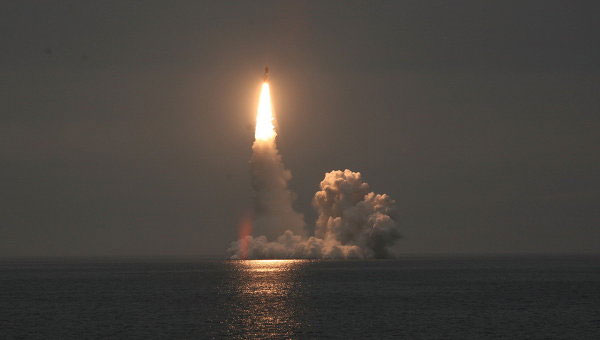Russian intercontinental missiles were destroyed by human error
The unsuccessful test launches of Bulava intercontinental ballistic missiles were caused by human factors.
This is the result of a lack of professionalism in the work of certain people, RIA Novosti quoted the Russian Army commander, Gen. Nikolai Makarov, yesterday.
Bulava missile launches began in 2004. However, 6 out of 18 attempts failed. In particular, successful test launches were only recorded from October 2010.

A Bulava missile launch test.
"You know that there are unsuccessful Bulava missile tests. We have stopped the tests, from which we carefully investigate the cause of the failures, and draw the conclusion that it is weak. People, " Makarov said in an Echo radio interview in Moscow. "There are people who have done their jobs unprofessionally. This is the key factor leading to failed test launches."
The Russian military commander added that there were initial soldiers who did not understand what the problem was, because four different issues discovered in the four Bulava missile tests failed.
"We found that the technology solution was perfect. A military officer was appointed to keep abreast of all the developments of the missile test, and then all the tests were successful," Mr. Makarov concluded.
On December 23, 2011, strategic submarine Yury Dolgoruky launched two Bulava missiles. The Russian Defense Ministry said the test was successful and the Bulava missile would soon be put into actual operation on the Russian navy. The Russian Navy commander, Admiral Vladimir Vysotsky, announced on February 11 that the army was about to simultaneously deploy Bulava and Yuri Dolgorukyi strategic submarine ballistic missiles this year.
- Top 10 most terrifying intercontinental missiles in the world
- Surprise with the 'ancestor' of all intercontinental ballistic missiles
- Russian test ballistic missiles
- Russia proposed using Satan missiles to destroy meteors
- Russia launches the Dnepr cosmic boosters carrying 23 satellites
- China is about to have nuclear missiles that can
- Where does the error 'Error 404' come from?
- The ultimate weapons help Russia erase the Soviet shadow
- 8 most terrifying ground attack missiles
- Russia tried the intercontinental missile
- Russian missiles fell into the sea immediately after leaving the platform
- American corporation makes ballistic missile components with 3D printers
 Van Allen's belt and evidence that the Apollo 11 mission to the Moon was myth
Van Allen's belt and evidence that the Apollo 11 mission to the Moon was myth The levels of civilization in the universe (Kardashev scale)
The levels of civilization in the universe (Kardashev scale) Today Mars, the sun and the Earth are aligned
Today Mars, the sun and the Earth are aligned The Amazon owner announced a secret plan to build a space base for thousands of people
The Amazon owner announced a secret plan to build a space base for thousands of people